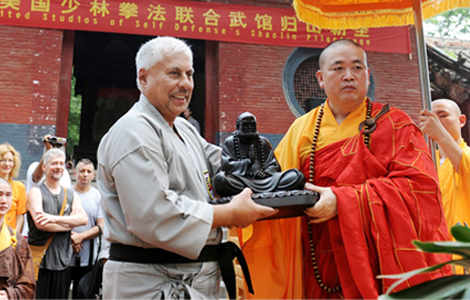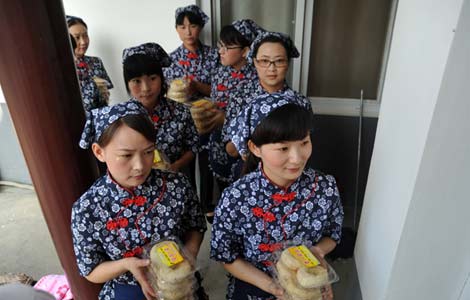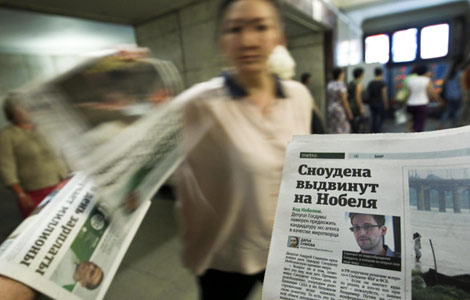Wealthy individuals 'see education as asset'
Updated: 2013-07-04 07:51
By Xie Yu and Yu Ran in Shanghai (China Daily)
|
||||||||
China will have the world's fastest growth rate for high net worth individuals, or HNWIs, who are turning to education-led consumption rather than showing off, a report from Julius Baer Group Ltd indicates.
China will have almost 1.4 million HNWIs, representing a wealth stock of $8.7 trillion, the Swiss private banking group said.
"More HNWIs will emerge in the next few years, supported by China's big economy and stable renminbi exchange rate, despite a possible slowdown in the economic growth rate," said Stefan Hofer, emerging market economist and lead author of the report.
The report noted that the cost of a tertiary education, especially at prestigious institutions, is rising faster than any other luxury item. However, it said, rich Chinese parents are most willing to spend on it.
"Chinese parents care about the next generation, and they want them to develop extensive connections with the world," said Kaven Leung, CEO North Asia of Julius Baer.
Zhuang Xiaoquan, a book retailer in Hangzhou, who last year sent his daughter to a girls-only independent boarding school in the United Kingdom, cannot agree more.
"I think the expense of an education for my daughter is a long-term investment and will eventually yield returns when she is able to find a job she is really interested in and good at," he said.
Tuition for the boarding school is almost 10,000 pounds ($15,190) a term, including accommodation, and the cost goes up every year.
With such a rapid increase in wealth under way, demand for luxury is well outpacing supply. Wealthy Chinese are showing their appetite and spending patterns in luxury markets.
Chinese HNWIs are expressing a growing appreciation for authentic luxury products, in which they look for quality and understatement over the importance of a logo, the report found.
"A big collection of Chateau Lafite might have been posh several years ago. But nowadays Chinese rich people are more interested in exploring new chateaux for wines that are not available in the auction houses," said Sun Yan, chief representative of Julius Baer in Shanghai.
"Compared with HNWIs in Europe or the United States where many inherit great fortunes, Chinese people have relatively 'new' money. And they are more open to new brands, to show their personality and taste," she added.
"Carrying a bag from a well-known luxury brand is no longer the fashion trend in Europe as people prefer to buy high-quality products with more design elements at reasonable prices," said Liu Ruojin, a returned overseas businessman from Wenzhou, Zhejiang province.
Liu is the chairman of Miss Coquine Holding, a France-based brand selling high-quality clothes, shoes and accessories.
Liu added that more successful businessmen tend to purchase certain limited items from niche brands to show off their unique tastes instead of wearing branded and expensive clothes and shoes with huge logos, which are available everywhere.
The emerging new rich in China are buying the world with their enormous appetite and money, but the report shows pressure for maintaining a luxury lifestyle is becoming stronger.
Based on a study of 11 cities in Asia, the Julius Baer said Shanghai is "expensive all-around".
A Botox treatment from a top doctor in Shanghai can cost more than $1,300, one-third more than in the next highest cost location, Hong Kong. Finely tailored men's suits, wine and cigars are also noticeably above the regional average, as are hotel wedding banquets and rooms.
These figures are partly driven by luxury consumption taxes ranging from 20 to 30 percent, but they also underscore China's pre-eminent position in wealth creation in Asia, the report said.
Contact the writers at xieyu@chinadaily.com.cn and yuran@chinadaily.com.cn
(China Daily USA 07/04/2013 page15)

 Ecuador finds spy mic for Assange meeting
Ecuador finds spy mic for Assange meeting
 US martial artists arrive at Shaolin Temple
US martial artists arrive at Shaolin Temple
 July 4 in Prescott: Balance of grief, patriotism
July 4 in Prescott: Balance of grief, patriotism
 Jubilant crowds celebrate after Mursi overthrown
Jubilant crowds celebrate after Mursi overthrown
 Growth slowing for services
Growth slowing for services
 Venezuela eyed as Snowden seeks asylum
Venezuela eyed as Snowden seeks asylum
 Anti-terror drill staged in Xinjiang
Anti-terror drill staged in Xinjiang
 Memorial service held for 19 Arizona firefighters
Memorial service held for 19 Arizona firefighters
Most Viewed
Editor's Picks

|

|

|

|

|

|
Today's Top News
US welcomes China's engagement in Africa
Data show shifts in US, China economies
Obama, Merkel agree talks on surveillance program
Filipino executed for drug trafficking
Obama orders US to review aid to Egypt
Snowden still in Moscow
China urges more efficient uses of fiscal funds
Egypt army topples president Morsi
US Weekly

|

|






